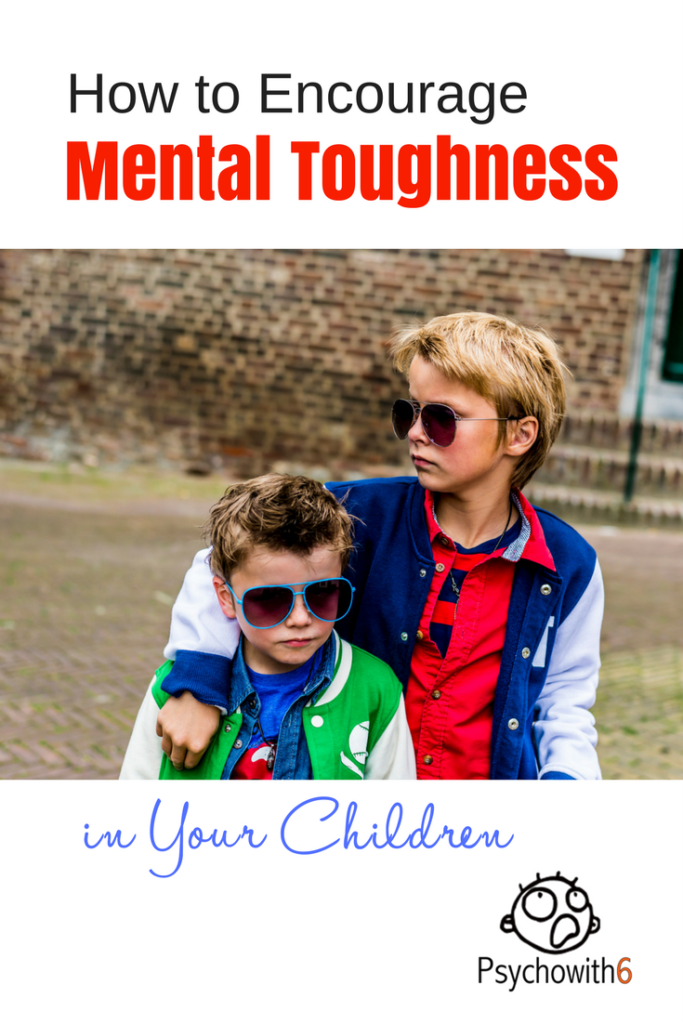How can we encourage mental toughness in our children and why does it matter?
First let’s define mental toughness. For our purposes mental toughness is being able to cope with and adapt to the challenges of life. We already know from the Bible that we will have trouble. So we are preparing our children for the inevitable. We want our kids to be strong in the Lord. We don’t want them to crumble at the first sign of adversity. I say that we can encourage mental toughness because I don’t believe this is a formal subject for which a curriculum or even a lecture is appropriate. Instead we have to encourage it as we live.How can we do that?
Allow children to experience natural consequences
I believe the first way we can encourage mental toughness in our children is to allow them to experience the natural consequences of their actions. As tenderhearted mothers, we often cringe at the potential for our children to suffer. We don’t want them to know the pain of their choices and would prefer to give them second and third and fourth chances. The problem, of course, is that children will never learn to make better choices if we shield them from the natural consequences.
I have an example for you. On multiple occasions my children have signed up to participate in things by their own choice. Later on, this same child of mine has decided that they didn’t feel like continuing to participate or participating on a certain day. They weren’t concerned that their teammates and coach or activity organizer was depending on them. The natural consequence is that I refused to shield them from was having to do something that they no longer wanted to do. Of course, as I allowed my kids to experience this type of natural consequence, I was also teaching them Christian character. They learn loyalty and faithfulness and commitment.
Anytime our children make a choice, there will be consequences, both positive and negative. It’s important that we refuse to protect them from the negative consequences unless they are truly destructive. You will have to pray and use your parental discernment about which natural consequences your child should have to endure. Our decision should always be loving and never abusive. But always keep in mind that the difficult consequences your children face will make them stronger.
Encourage children to take responsibility
The second way we can encourage mental toughness in our children is by insisting they take personal responsibility. A refusal to take responsibility for our own choices and mistakes goes all the way back to the Garden of Eden. We shouldn’t panic if our child has a propensity to shift blame to others, because it is the human condition. However, we should not allow our children to shift blame without rebuke. Even when someone else’s choice or the circumstances were a contributor, our children need to take responsibility for their part in a bad situation. Did your child participate in the appearance of evil? Did your child stand by as someone else did something wrong?
Encouraging your child to take personal responsibility is an easy thing to do when it comes to team sports. If your child has the habit of blaming other players, the coach, or the conditions for their errors, ask your child to own up to their mistakes. At the same time, it’s important to teach children that admitting to mistakes does not mean they are unloved or without value. Some children believe that if they admit to doing wrong, it means they are worthless. In fact, some adults believe this as well and it explains why many people refuse to apologize. Instead, remind your child that everyone makes mistakes. And not just mistakes, but sinful choices. God has already offered us the solution for this. Our sins do not keep us out of fellowship with him or out of fellowship with one another if we admit them and ask for forgiveness. This is likely a lesson that will need to be repeated multiple times.
Teach children to feel the fear and do it anyway
The third way we can encourage mental toughness is to teach our kids to feel the fear and do it anyway. Anxiety is very uncomfortable. It makes sense that we as parents don’t want our kids to feel uncomfortable. This is particularly the case if we have our own anxieties. But keeping our kids from feeling the fear and doing it anyway will make the fear grow bigger. You may want to listen to the episode I did on anxious homeschoolers.
[LISTEN TO HELP FOR ANXIOUS HOMESCHOOLERS]
Anxiety that isn’t challenged will spread to more and more situations. You may think that it is better not to have your child do the public speaking assignments for your co-op. But soon your child will be balking at other assignments that tap into his social anxiety. You will be doing your child a great service to encourage your child to feel the fear and do it anyway.
In order to do that, we have to give our kids the tools they need to cope with anxiety. Those tools will likely include meditation on Scripture that relates to trusting God, taking deep breaths, relaxation training, and mental imagery in which your child practices relaxation. Our kids need to know that avoiding anxiety will make it worse.
Teach children how to control their thoughts
Related to encouraging our kids to confront their fears is the truth that we are capable of controlling our thoughts. As parents, we want to discuss with our children the importance of taking thoughts captive. Many thoughts will come to us briefly that are not within our control. But once we have the thought, we are capable of controlling it. The Bible tells us to take every thought captive and to bring it into obedience to Christ. We can do this or we wouldn’t be given this directive. We can also renew our minds. I encourage you to read about my post on the topic.
[HOW TO RENEW YOUR MIND THROUGH TRUTH JOURNALING]
We do not have to accept the thoughts we have that are lies. Sometimes writing those thoughts down enables us to combat them with the truth more easily. The mental battle our children will have when dealing with challenging circumstances is the most important one. When our child believes a lie about her circumstances she is likely to respond with a negative emotion, which will in turn affect her behavior. Mental toughness is developed by being a disciplined thinker. For more on controlling thinking, read about black-and-white thinking in your homeschool.
[BLACK-AND-WHITE THINKING IN YOUR HOMESCHOOL]
Model mental toughness
The fifth important way we can encourage mental toughness in our children is to model it. If we refuse to accept the natural consequences of our choices, if we refuse to accept personal responsibility for our behavior, if we refuse to feel the fear and do it anyway, and if we persist in thinking and meditating on lies, our children will not develop the mental toughness that will be such an asset to them in the future. We must work on our own mental toughness in this regard. Furthermore, we have to be talking with our children about the challenges we are dealing with. Talk with them about the situation with as much detail as is appropriate for your children’s ages, and then talk about the strategies you are using to cope. Modeling is incredibly powerful. So many people will share examples of their parents’ mental toughness once they are adults and are reminiscing on their lives. We want them to have plenty of examples of mental toughness to hold onto.
Provide your children with mental toughness role models
Along with modeling, we want to give our children access to other role models. This suggestion is one that we can easily incorporate into our formal homeschooling. I love exposing my children to missionary biographies and Christian historical biographies that demonstrate mental toughness. Reading about men and women who suffer unjustly, rely on their God, and bravely serve despite trying times will instill a desire for mental toughness and a framework for pursuing it for our kids. I love YWAM biographies for this purpose, but books about Esther Kim, Samuel Morris, and Winston Churchill are more of my favorites for giving kids mental toughness role models.
Conclusion
To conclude, I want to give you a picture of the importance of mental toughness. You’ve likely heard the story of the person who wanted to help a butterfly that was struggling to emerge from its chrysalis. The person removed the chrysalis and the butterfly died. The struggle to emerge from the chrysalis is what provides the butterfly with the strength to live. In the same way, we do not want to prematurely remove the struggle from our children’s lives. Our kids are going to be dealing with difficult circumstances, challenging people, and injustice in the future. Like arrows in our quiver, we want them to be sharp enough to wage battle against the enemy in the years to come.
How do you encourage mental toughness in your kids?







